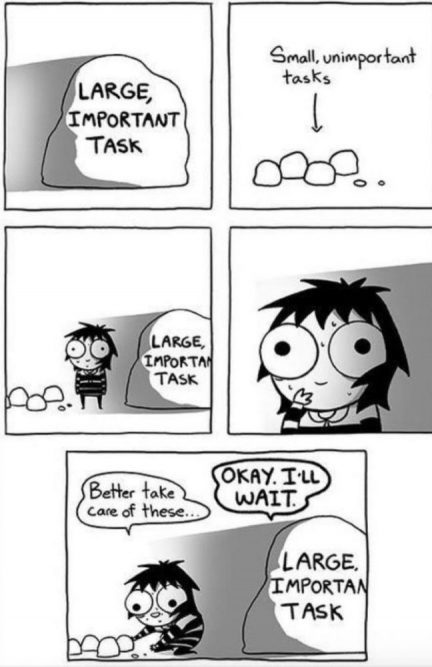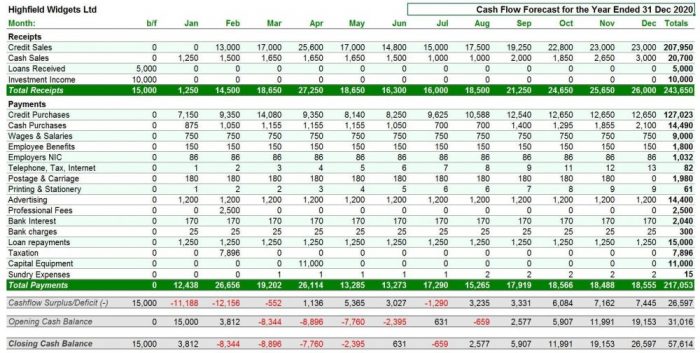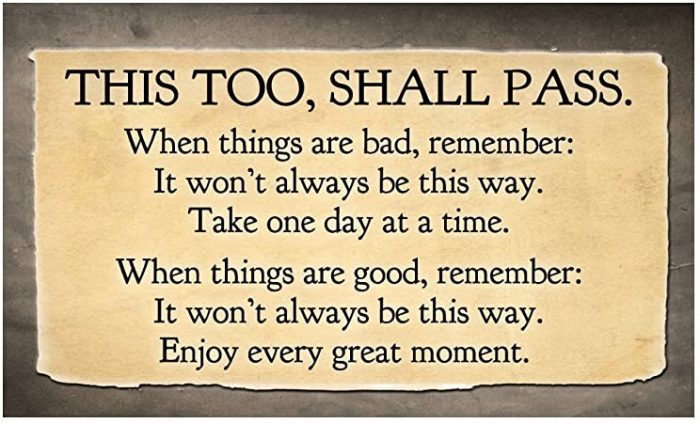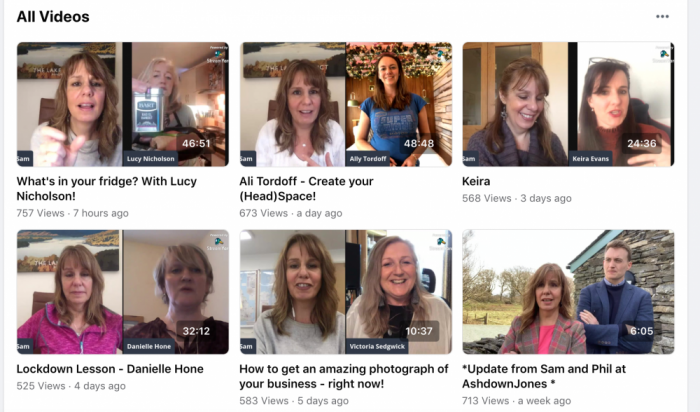We are living in unreal times, for sure. No one really knows what’s going to happen over the coming months, and that’s a scary thought for agency owners like us, who don’t even know if they will be able to open their doors again any time soon.
Over the past week, Phil and I have talked to many agency owners, of brands large and small, to find out what actions they are taking, how they are managing the crisis, and what advice they have that might help other agency owners like you.
You’ll find some of these interviews on our private Facebook group here. If you’re not already a member, just pop in some details and we’ll add you straight in so you can see the videos.
In this article, I’m going to focus on what I consider to be the 3 Cs of this crisis. Get these right, and you’ll put yourself in a far better position to not just survive the next few months, but to come out of these period with a leaner, stronger business. They are:
1. Cash
2. Communication
3. Content
Run out of cash, and you run out of road. No cash = no business. It’s vital you protect your cash throughout the next few months. As our accountant said to us the day before lockdown: “Cash is king – now, more than ever.”
Communication isn’t just for your team, or for your clients. It’s also how you are communicating with the wider world; as a business owner, and as an individual. Because for the foreseeable future, more than ever, you are one and the same person.
Content – here, we look at what content you need to be sharing on your social platforms, and also offline, by letter. Now is not the time to be offering ‘virtual valuations’ – you need to be useful in every possible way. More on that in a bit.
But before we dive into these three Cs, let’s look at how you’re actually approaching the situation personally. I’m sure you’re missing your team right now, if you have one, and that regular human interaction that you probably took for granted before we all got told to stay at home. It would be so easy now to get up late, drift around in PJs, and disappear into Netflix land. But you can’t. You have to stay professional and productive, and to do that, you need to stay active and as close as possible to your usual routine.
Structuring your day effectively will give you focus and purpose, so get up at your normal time – set an alarm if you need to. If you tend to go for a run before work, then still do that. If you were in the habit of going to the gym after work, set up a space at home where you can do some simple exercises – perhaps bodyweight exercises (just search for these on YouTube) or using tins or milk cartons full of water. Anything you can do to stay physically strong and active will keep your brain strong, too.
If you have family at home, it’s probably not fair on them for you to isolate yourself in your home office all day, so make time for them too. Maybe eat lunch together, take some daytime exercise as a family, and contribute to the home-schooling responsibility.
You’ll probably feel like you’re being torn; after all, you may be doing absolutely everything for your business – sale progression, maintenance issues, and the usual emails and admin tasks. This is hard, but if your day lacks structure, you’re going to find it difficult to stay motivated to do even the basics.

Look at your work-from-home space too. Even if all you can find is a corner of a bedroom, make it your own. Create a space where you can be productive, preferably looking out of a window, or with plenty of light. You may be spending hours there each day, so take the time to create an attractive space you actually want to spend time in.
Don’t make endless to-do lists that you never get to the bottom of. Just choose a small and manageable number – five is plenty – so you feel like you’ve achieved something by the end of the day. Some tasks are actually projects, so don’t just add them to your list. For example, ‘sort out website’ is a project that may take you weeks, not hours.
Now is not the time to binge eat, or eat rubbish all day. Eat as clean as you can, with fresh fruit and veg playing an important part of your daily diet. If you stuff yourself with too many carbs and snacks, you’ll find it really tough to stay motivated and productive throughout the day. And you’ll also run out of energy before your kids do, which is never a good idea.
Once you have a strong work-from-home foundation – structure, routine, balance, activity, healthy eating and productivity – you can focus on cash, communication and content, to strengthen your business from the inside out, and come out of this crisis fighting fit.
CASH
It’s so important to know your numbers now. You can’t keep paying money out with nothing coming in; you’re just going to run out of cash very quickly. Take advantage of all government help before you do anything else, even if you think you might not need it. For example, you may have your vat put to one side ready to pay the next quarter, but defer your payment, and hang on to it. Consider it a reserve fund, for if this situation goes on longer than everyone expects. After all, any cash is better in your bank account than theirs.

If you haven’t already, create a cash flow forecast. (Use my template here if it helps.) Base it on worst case scenario, and then try to mitigate any danger points. (If you’re not sure how to use a cash flow forecast or you don’t feel confident yours is accurate, just ping me a message and I’ll help.
So far, the possible financial help from the government falls into three categories:
1. Loans
2. Grants
3. Deferments
Check you’ve taken advantage of all three, where possible. These include:
- Business interruption loan (12 months interest free)
- £10k grant for those with premises claiming Small Business Rates Relief
- Vat deferment
- Business rates deferment
- Council tax deferment
- Three-month mortgage holiday
- Self-employed help at 80% of profits up to £2500/month
There’s little point in my sharing detailed advice as it may quickly become irrelevant as the situation is ever-changing, so check for yourself what you can claim on the up to date information. Money Saving Expert is a great resource, as it’s constantly and accurately updated. Also ask your accountant and even your bank for updates and advice, as they should be well-informed.
Whilst it’s important to cut out all unnecessary spend and reduce your outgoings as much as you can, don’t just stop paying all your bills immediately. If everyone simply stopped paying one another, the money would stop flowing. Your office cleaner, if you don’t pay her, can’t pay for her groceries. The grocer can’t pay their gardener. And so it goes round. You can set an example here, by continuing to pay all the bills you can do, especially to small local suppliers. For your larger suppliers, like software providers, have a conversation with them. Pick up the phone and negotiate. As Katie Griffin in this interview says:
“You’ve supported them – it’s time for them to support you.”

Now is a great time to reassess your business. If you were starting again would you buy that subscription? Or commit to that lease? Making good decisions may not have been a priority when you had money in the bank and more coming in, but now it’s vital. I get that you’re feeling the pressure, but don’t bury your head in the sand. Learn to use a spreadsheet and to make your cash flow your friend. If money is really tight, both in your business and personally, a daily cashflow forecast will really help you to find those danger days when you’re going to run out of money, so you can do something about it in advance. Some agencies (ours included) are sales only, and therefore we need to be prepared for a time when our pipeline will dry up completely.
The steps you take now will ensure the future security of your business. If you have a decent pipeline, you may not feel the financial effects of this situation for some months, but there will almost certainly be a sting in the tail down the line, maybe 6 months or more from now. So anything you can do to future-proof your business your future self will thank you for later. And you’ll be protecting your team’s jobs too. Some agency owners are yet to react to this crisis, and are just hoping they don’t run out of money. Don’t let that be you.
COMMUNICATION
How are you showing up right now? Are you shrinking away from clients, employees and family, unwilling to face the situation? Or are you becoming ranty and sweary on your Facebook profile, telling other folks what to do?
How you show up is how you will be judged. Disappearing is not an option right now, and nor is shouting at others. How you think about this situation affects everything and everyone you communicate with.
“We choose how we’ll look at things…how we approach, view and contextualise an obstacle, and what we tell ourselves it means,determines how daunting and trying it will be to overcome.”
– Ryan Holiday – The Obstacle is the Way
Showing up strong and positive, with matching body language and expression is your biggest asset right now. People around you are looking for leaders who portray certainty and authority, so make sure that is you.
Communicating with your team
If you have furloughed your team, technically this means they can’t do any work. But they can volunteer. The best, most proactive team members will want to use this time productively, and further their professional development. After all, how they act over the next few weeks may determine whether they actually have a job to return to when things go back to ‘normal’. So have a chat with them, and recommend books, video training and any other resources that will help them to learn or hone skills. They will almost certainly be missing the camaraderie of the office, so arrange optional Zoom meetings, and keep any WhatsApp or Facebook chats and groups active.
Communicating with your clients
The day we closed, Phil (the Jones of AshdownJones) and made a Facebook live to explain the situation, then we called every vendor and explained to them what we were doing, and how it would affect them. They were all understanding and supportive, but we still both found the process incredibly draining emotionally. We knew they needed to hear certainty and authority in our message, so they could feel calm and reassured about facing the situation ahead. They had questions, understandably, about whether they should remain on the market, if they already were, or whether they should go ahead and launch, if that was imminent. They also asked about viewings, pending offers, surveys, conveyancing, and more. All we needed was to take the time to listen to their concerns, and answer their questions honestly and transparently.

If you’ve already called all your clients, put a communication plan in place to send them an email or a letter next, then call them again in one or two weeks’ time. Some of your clients may be elderly, and may appreciate an offer of help with getting necessities right now. Or they may be feeling lonely, and a video chat could help them to feel more connected. Whatever you do now will be remembered when you re-open your doors, and will help to foster loyalty from your current clients. (Andrew Baxter from Enfields discusses this in his video interview here.)
CONTENT
Producing and distributing valuable content is VITAL right now. Here’s why:
- Reassurance – people need to hear from you in this time of great uncertainty
- Remain top of mind – in a positive way
- This too shall pass – and when it does, you’ll be ahead of the curve
- No competition – it’s unlikely your competitors are communicating positively right now, so you’ll stand out for all the right reasons
- Seen as a thought leader – authoritative and professional, when others may not be portraying such an image

Direct mail – many of our Firewave clients have asked us if they should still be sending out letters, and the answer is ‘yes’, now more than ever, for all the reasons above. But these should NOT be your usual sales letters. Your letters right now need to explain, educate and reassure – not sell. Now is not the time to offer a ‘virtual valuation’ – these kinds of tactics may well damage your brand and professionalism when you are able to offer in-person consultations once again. Tell your reader what the current situation means for them, whether they are a vendor, buyer, landlord or tenant. Information from a trusted source is more valuable now that it ever has been.
However you usually send out your letters, try changing it up. If you always post out in a white C5 envelope, for example, try a cream DL textured one. Be careful with colour – professionalism is paramount here, so pale blue, pale grey, white or cream are all acceptable – but red, green or yellow aren’t a good idea right now.
Articles and blogposts also need to be informative. Use the same format and content as your letters, but make it more conversational in tone. It can be longer, too. Blogposts should be a minimum of 1,000 words to be seen as a reliable and authoritative resource by Google, so make your blogposts long and packed with information using words and phrases people will actually be searching for right now. If you’d like to know how Firewave can help you by creating relevant timely content, pop me a message here and I’ll tell you if your area is free.)
Video content is more important now than it ever has been. People need to see your face and demeanour to feel reassured – now is not the time to retreat into your shell, but to come out confident and reassuring. It’s also the best time to focus on other local businesses, not your own. For example, when this crisis first broke, we did a mini series of videos called “Business as UNusual”, featuring local businesses and exploring how they were dealing with the crisis. As the situation developed and we went into lockdown, the video interviews became remote, and focused instead on something we call #LockdownLessons – video lessons from expert local business owners, explaining everything from ‘What’s in Your Fridge?’ by a local restaurateur, to ‘5 Top Tips to keep your Family Active during Lockdown’ by a popular Personal Trainer.

So far, they are averaging around 600 views each, which is a great result and will stand us in good stead in Facebook’s algorithm when we start posting ‘normal’ content again.
You have two choices here, you either shrink back into yourself and hope this will blow over before your sanity vanishes, or you can step up, speak out, and create a following that will stay loyal to you for years to come. What’s it to be?
Last thoughts
The market, when it returns, will be weak and lacking in confidence. You need to be prepared. (Georges Verdis explores the market correction and possible bounce back here.) At this stage, we have no way of knowing how quickly things will return to some semblance of normal – it could be more than a year. Lenders may not return with the buyers, leaving us with post-2007 borrowing limitations; discretionary sellers may sit on their laurels while they wait to maximise their selling price, and buyers may sit tight, worried about job security as their employers fight to keep their businesses open.
In the meantime, you need to be authoritative and professional, even when you aren’t sure what’s going on. Talk to your team, your clients and your audience often, and with a smile. Be seen to be in control – being visible and calm is what people need of you right now. The level of confidence in the property market will be our biggest hurdle, and one that all of us are in part responsible for. This is your opportunity to contribute to that confidence in a positive way.
It’s also your time to learn, to develop as a person and business leader. Read everything you can, acquire a new skill, watch YouTube videos – anything you can do to come out of this period of time stronger will serve you in the months and years to come.
If you had heard a month ago what was going to happen, you wouldn’t have believed you could survive. But you can. You need to project “I’ve got this” even if inside you’re not so certain. The certainty you portray will attract and reassure those who are less certain.
You chose this path, the path of a business owner. With that position comes responsibility. Now is your chance to step up as a leader and embrace that responsibility. Leadership up until now may have just been about hard work – arriving in the office first, leaving last, keeping everything ticking over. But things have changed. Leadership now is about being strong and acting with courage.
The manner in which we survive this time we will be judged upon later. By our team, our clients, our suppliers, our community, our families.
And ourselves.
“The pessimist complains about the wind. The optimist expects it to change.The leader adjusts the sails.”
– John Maxwell
Sam

What to do next: Do you get my Supertips? They’re jam-packed full of great tips and marketing strategies just like this one, and best still – they’re free! Get yours here ->www.samashdown.co.uk/samsupertips
Speak to Sam: If you’d like to know how I think you could improve your marketing, just answer a few short questions here and I’ll tell you if and how you could be more effective.


